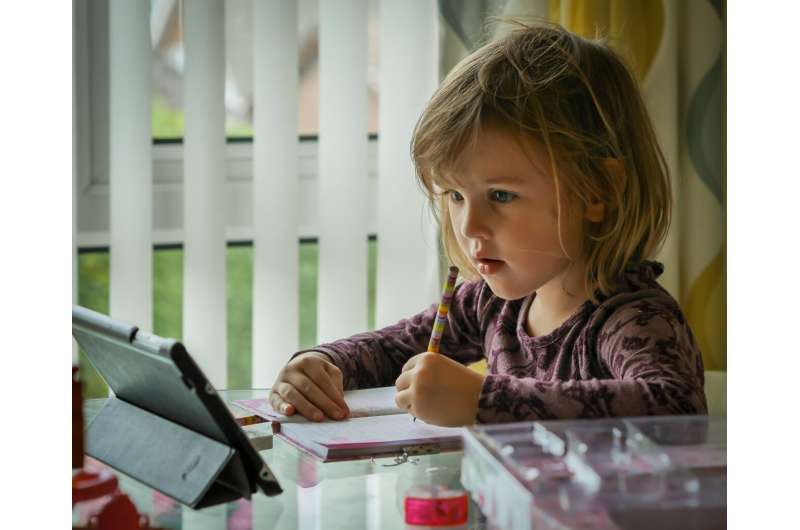This article has been reviewed according to Science X's editorial process and policies. Editors have highlighted the following attributes while ensuring the content's credibility:
fact-checked
trusted source
proofread
COVID-19 school and daycare closures left working mothers physically and mentally exhausted, study shows

Home-schooling and caring for children during the COVID-19 school and daycare closures left many working mothers physically and mentally exhausted and with little or no time to switch off, a new study shows.
The experience left working women with children feeling stressed, guilty, and worried, researchers found.
Mothers often felt overly stressed trying to balance work and family responsibilities, guilty for not meeting their child's needs, and were worried over their child's well-being and academic progress and increasing work demands.
Most of those who took part in the research found their workload increased dramatically, having a negative impact on their well-being and their children.
Supporting home-schooling while working and as part of an already heavy daily routine caused "frustration" and "home school" fatigue. It involved managing conflicting demands and handling constant interruptions and unforeseeable events such as child emotional outbursts and sibling fights.
The study, by Angeliki Kallitsoglou from the University of Exeter, and Pamela-Zoe Topalli from the University of Turku, Finland is published in the journal Frontiers in Sociology.
Dr. Kallitsoglou said, "These findings underscore the importance of prioritizing maternal well-being in post-pandemic recovery efforts. What is needed for mothers is timely access to intervention for mental health and also family-friendly work policies and offering support with childcare and children's learning as essential measures.
"Our research shows the need to recognize the importance of paternal involvement in domestic work and family life for the well-being of working mothers."
A total of 47 working mothers in the UK took part in an anonymous online survey of open-ended questions. Around half of those who took part worked full time, and 85% worked from home. Their children were aged between 1 and 17 years. A total of 70% were homeschooling children and three quarters were married.
One full-time home-working mother with a young child said, "I've worked all the hours in between looking after the little one and the house work and the life admin and the food shopping. I've worked till 10 pm at night to write reports, checked emails at 7 am or on the go (they go straight to my personal mobile so I cant switch off). I feel conflicted all the time, like I cant do it all but people around me seem to do it all and if I drop the ball on something I feel like I've failed. I want to be a great mum and great at my job and the cost comes to my personal well-being."
Difficulties with working and home-schooling at the same time intensified if children were young, had, special educational needs (SEN), a challenging temperament or were not motivated.
Dr. Kallitsoglou said, "Mothers felt stressed because of having to manage competing tasks such as work, home-schooling/caring for children, and household chores. Mothers also felt guilty, as if they were not being good enough, not measuring up to other parents, and not spending enough time/making an effort to home-school and support children's learning.
"Others felt angry and resentful, often in response to unequal distribution of chores, not being able to send kids to school like other parents, and increased workloads. While for a few mothers the lockdown experience evoked positive emotional states such as feeling grateful and motivated, energy and motivation waned after a while for many."
Several partners of those who took part in the study took on more responsibility at home because of home-schooling and the increased need for childcare. A few mothers reported that their partners' involvement in home duties was limited. Often, this was due to a gendered approach to domestic responsibilities which mothers were not happy about.
Flexible working arrangements allowed more time for family, to exercise and prepare fresh meals, to improve sleeping habits and, in some cases, to pick new hobbies.
However, not everyone benefited by flexible working arrangements. A few mothers were worried over being less visible at work. For others it meant disrupted family routines, blurred boundaries between work and family life, and intensification of housework including preparing fresh meals and cleaning.
The school was another important source of support and included provision of devices, individualized support for SEN, and access to lesson plans or worksheets posted online. But on-line lessons were not always perceived as helpful and pleasant when combined with the expectation of sharing on-line parent-child joint activities which working mothers did not have the time to engage with.
A few mothers voiced concerns over the adequacy of the support provided, the frequency of communication with teachers and schools, the excessive amount of homework, and the demands made on parent's time to home-school.
More information: Angeliki Kallitsoglou et al, Home-schooling and caring for children during the COVID-19 lockdown in the UK: emotional states, systems of support and coping strategies in working mothers, Frontiers in Sociology (2024). DOI: 10.3389/fsoc.2024.1168465
Provided by University of Exeter





















